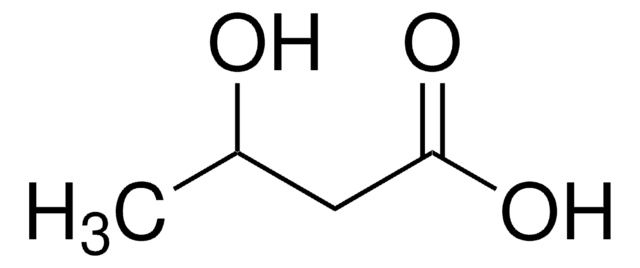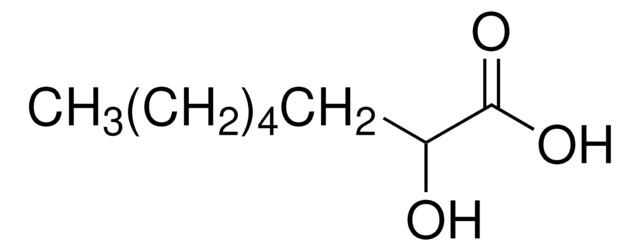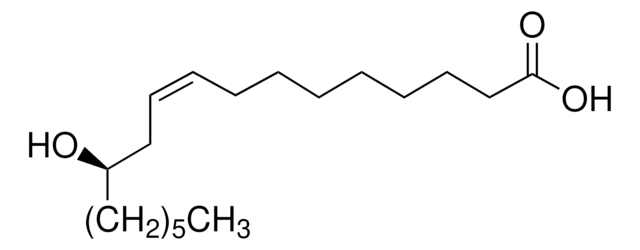Alle Fotos(1)
Wichtige Dokumente
H4148
DL-β-Hydroxy-myristinsäure
≥98%
Synonym(e):
3-Hydroxy-tetradecansäure
Anmeldenzur Ansicht organisationsspezifischer und vertraglich vereinbarter Preise
Alle Fotos(1)
About This Item
Empirische Formel (Hill-System):
C14H28O3
CAS-Nummer:
Molekulargewicht:
244.37
MDL-Nummer:
UNSPSC-Code:
12352211
PubChem Substanz-ID:
NACRES:
NA.25
Empfohlene Produkte
Biologische Quelle
synthetic (organic)
Qualitätsniveau
Assay
≥98%
Form
powder
Funktionelle Gruppe
carboxylic acid
Lipid-Typ
saturated FAs
Versandbedingung
ambient
Lagertemp.
2-8°C
SMILES String
CCCCCCCCCCCC(O)CC(O)=O
InChI
1S/C14H28O3/c1-2-3-4-5-6-7-8-9-10-11-13(15)12-14(16)17/h13,15H,2-12H2,1H3,(H,16,17)
InChIKey
ATRNZOYKSNPPBF-UHFFFAOYSA-N
Biochem./physiol. Wirkung
DL-β-Hydroxymyristic acid (3-HTA) is a mixture of D- and L-β-hydroxymyristic acid enantiomers. 3-Hydroxytetradecanoic acids are used to study their roles in biological processes such as oxidative stress, inflammation and insulin resistance. 3-HTA is also used in endotoxin and lipid A research.
Lagerklassenschlüssel
11 - Combustible Solids
WGK
WGK 3
Flammpunkt (°F)
Not applicable
Flammpunkt (°C)
Not applicable
Persönliche Schutzausrüstung
Eyeshields, Gloves, type N95 (US)
Hier finden Sie alle aktuellen Versionen:
Besitzen Sie dieses Produkt bereits?
In der Dokumentenbibliothek finden Sie die Dokumentation zu den Produkten, die Sie kürzlich erworben haben.
Kunden haben sich ebenfalls angesehen
K Tanamoto
Advances in experimental medicine and biology, 256, 203-213 (1990-01-01)
New quantitative method for the detection of minute amounts of endotoxin has been developed using 3-hydroxytetradecanoic acid as a chemical marker. After converting 3-hydroxytetradecanoic acid to methyl ester, it was coupled with a fluorescent probe, anthracene-9-carboxyl chloride, obtained by chlorization
Pauline Grimm et al.
The British journal of nutrition, 123(4), 372-382 (2019-11-07)
Starchy diets can induce hindgut dysbiosis in horses. The present study evaluated the impact of a yeast (Saccharomyces cerevisiae) and microalgae (Aurantiochytrium limacinum) supplementation on caecal, colonic and faecal microbial ecosystem and on blood inflammatory parameters of horses fed high-fibre
Wenkuan Liu et al.
Applied microbiology and biotechnology, 76(5), 1153-1159 (2007-08-02)
Medium-chain-length polyhydroxyalkanoates (mcl-PHA) consisting of 3-hydroxyhexanoate (HHx), 3-hydroxyoctanoate (HO), 3-hydroxydecanoate, 3-hydroxydodecanoate, and high-content 3-hydroxytetradecanoate (HTD) was produced by knockout mutant Pseudomonas putida KT2442 termed P. putida KTOY06. When grown on 6 to14 g/L single-carbon-source tetradecanoic acid, P. putida KTOY06, which
A S Soydan et al.
Mediators of inflammation, 2006(5), 64980-64980 (2007-03-30)
Beta-hydroxy fatty acids are a major component of lipid A moiety of lipopolysaccharide. We aimed to investigate the role of free beta-hydroxy fatty acids on inflammation, as well as to evaluate their effects on cytokine release from human blood cells
Anelise M Tonin et al.
Neurochemistry international, 56(8), 930-936 (2010-04-13)
Accumulation of long-chain 3-hydroxy fatty acids is the biochemical hallmark of long-chain 3-hydroxyacyl-CoA dehydrogenase (LCHAD) and mitochondrial trifunctional protein (MTP) deficiencies. These disorders are clinically characterized by neurological symptoms, such as convulsions and lethargy, as well as by cardiomyopathy and
Unser Team von Wissenschaftlern verfügt über Erfahrung in allen Forschungsbereichen einschließlich Life Science, Materialwissenschaften, chemischer Synthese, Chromatographie, Analytik und vielen mehr..
Setzen Sie sich mit dem technischen Dienst in Verbindung.












